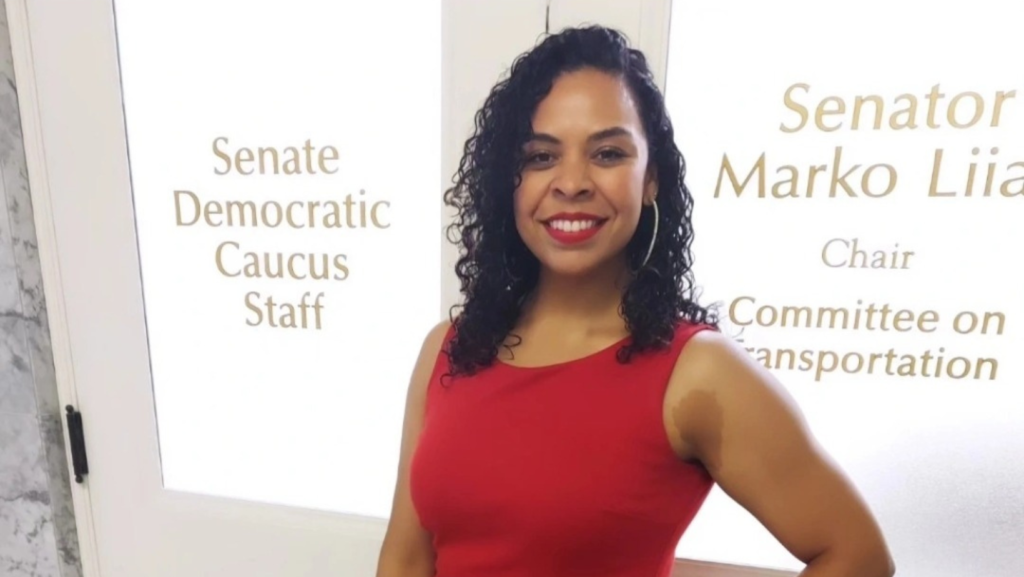The following story is part of RoyalTee’s series, Too Black to be Latin, Too Latin to be Black

Dr. Natalie Hart is trailblazing a path for Afro-Latinos in the political realm. At 37, she is the first Afro-Latina to become the Equity Strategic Advisor, an inaugural role for the Washington State Senate.
Within her role, Hart advises people, specifically those part of the Senate Democratic Caucus, as they develop policies and bills that would ultimately become laws in the state of Washington.
“I help to shape that development and help folks see things through an equity lens,” says Hart. “I also incorporate in organizational change, training and facilitation around issues and equity in the spectrum of diversity, equity, inclusion.”
Her mission is clear: to help create a more just and inclusive society, not only through legislation but through systemic transformation, inspired by own upbringing.
Carrying two buckets
A native of Tacoma, Washington, Hart grew up fully aware of her multi-ethnicity. Her mother is Mexican, and her father is Black and white, with a Caribbean background. Hart identifies as Afro-Mexican; however, growing up, she found it hard to figure out where she fit in.
“I grew up in the Pacific Northwest,” Hart added, which is a predominantly white area. “So, I didn’t have terminology like Afro-Latina, to be able to categorize myself.”
Hart recalled times facing questions about her ethnicity and being caught between two worlds. For example, when Black girls would talk about getting their hair braided by their Black mothers but not having that experience with her own mother.
“It was always that question of, what are you? What are you like? I can’t tell, like you look black, but you look like something else. On the Latin side, she was criticized for not having a Spanish last name or speaking the language fluently.
“It’s like carrying two buckets that are never full enough,” Hart reflects on her childhood. “Just walking around with two buckets that are just not enough to be in this community and not enough to be in the other and you need a full bucket to be a part of it, and it just always felt like I’m in this middle and not being enough.”
Passing the mic
But today, Dr. Hart no longer feels the need to justify her identity. Armed with the language and history and a better understanding about the divisiveness of colonization, Hart has dedicated her life’s research to learning about culturally responsive practices, systemic racism, and how it’s incorporated into everyday lives.
“Now I have a stronger sense of who I am, and to know that who I am is enough in these spaces,” she says. “There’s no one that has the authority to tell me that I am not Mexican enough, I’m not Black enough, I’m not Caribbean enough. I’m allowed to create that narrative of what it means to be a part of these communities.”
It’s this sense of empowerment that Dr. Hart seeks to impart to others. “To anyone who feels in the middle, like I used to feel, know that you are enough. You create that experience and you belong in every space that you walk into.”
Hart, who is a first-generation college graduate and member of Zeta Phi Beta Sorority, represents the less than 2% of women who have a Ph.D. She received her bachelor’s degree from the University of Washington and her doctorate from the University of Southern California. In her current role, she aims to open the door for others and amplify voices from marginalized communities.
“It’s not so much speaking for somebody who doesn’t have a voice, because we all have voices,” she asserts. “I never liked that narrative, but it’s about being able to pass the mic to the community. If I can help facilitate making those conversations happen, I’m proud to be able to do that. And it’s an honor to be able to do that. And I don’t want to be the last.”
Hart’s ambitions do not stop here. She aspires to one day work in Washington, D.C., and become the first Afro-Latina Secretary of Education, a U.S. ambassador, or work in corporate leadership.
“If there’s it’s not, if there’s not a seat at the table, you bring your folding chair,” quoting the late Shirley Chisolm, the first Black woman to run for president of the United States. “So, I’m happy that I do have that seat. I did not bring the folding chair, but I do not want to be the last.”


